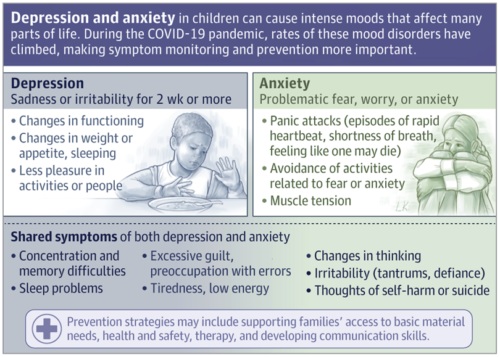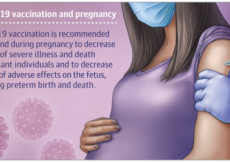May 11th, 2022
May is Mental Health Awareness Month
In 2019 — one year prior to the start of the COVID-19 pandemic — the Centers for Disease Control and Prevention reported that 9.4% of children between the ages of 3 and 17 years (approximately 5.8 million) had a diagnosis of anxiety and 4.4% (2.7 million) had a diagnosis of depression. In reality, those numbers are probably significantly higher because many children and teenagers who are clinically anxious and depressed never get evaluated, diagnosed, and treated for these two common mental health conditions.
The pandemic has only exacerbated this national emergency in child and adolescent mental health. We learned on Monday that the mental health crisis among teenagers is accelerating, with more than 40% of teens saying in a recent survey that they felt “persistently sad or hopeless” and 20% reporting suicidal thoughts. The survey, conducted by CDC researchers and published in March, showed more than a third (37%) of high school students reported feeling their mental health was “poor” during the pandemic.
For more than a decade before the pandemic got underway in 2020, poor mental health and suicidal behaviors in American teenagers were increasing, according to the CDC’s fact sheet on mental health among adolescents:
Mental health and suicide ideation or actions among young people is a severe and growing problem in the United States. Poor mental health is associated with a host of health risks, both during adolescence and into adulthood. It can lead to risky sexual behavior, illicit substance use, unintended pregnancy, school absence and dropout, and other potentially life-long health problems.
All kids can be moody and many harbor fears that are both real and imagined. It’s when those moods and feelings become so intense that they interfere with a person’s daily functions and relationships with family members and peers that a diagnosis of depression and/or anxiety is considered, Mary Margaret Gleason, M.D. and Lindsay A. Thompson, M.D. explained on JAMA Pediatrics Patient Page back in March:
Depression is mostly a problem of moods. Sadness or irritability are the core symptoms, and thinking, sleeping, eating, and energy are also affected. Anxiety disorders are difficulties with worries or fears that make it hard for a child to participate in their day-to-day life. Extreme fears can focus on specific types of situations, such as social situations or being away from parents, or can be generalized about almost anything. Anxiety can also include panic attacks with rapid heartbeat or trouble breathing.
Depression and anxiety can cause difficulties with sleeping, thinking, or managing frustration. It is common for anxiety or depression to first be noticed with disruptive behaviors such as trouble with rules, talking back, or tantrums.
Anxiety and depression can occur at any age during childhood and adolescence. Sometimes there is a genetic predisposition and sometimes there isn’t. Fortunately, with therapy from a trained professional and medications (if needed), both anxiety and depression can be successfully treated:
Depression and anxiety are treatable with therapy that teaches specific skills, medications, or both. Specific treatment plans depend on age, severity of symptoms, ability to access therapy, and family preferences.
Families can take care of your own mental health, talk about feelings starting at an early age; teach and model healthy coping strategies; keep your child safe from weapons, abuse, and preventable incidents; and talk to your child’s health care professional.
Managing a child exhibiting signs and symptoms of anxiety and depression can be frustrating and scary for parents, who at the end of the day just want their kids to be happy and content inside their own skin. Child and adolescent psychologist Dr. Clark Goldstein advises parents on what to do (and what not to do) when their children are anxious:
When kids are anxious, it’s natural to want to help them feel better. But by trying to protect kids from the things that upset them, you can accidentally make anxiety worse. The best way to help kids overcome anxiety is to teach them to deal with anxiety as it comes up. With practice, they will be less anxious.
Read the rest of the article from Child Mind Institute to find 10 “pointers for helping children escape the cycle of anxiety” here.
(Image: JAMA Pediatrics Patient Page – March 28, 2022)




































